Emerging Issues in Tourism Industry: Conference Proposal Report
VerifiedAdded on 2022/08/19
|12
|2684
|17
Report
AI Summary
This report presents a conference proposal focusing on emerging issues in the tourism industry, specifically urban tourism. It delves into the complex relationships between tourism, market forces, and government policies, emphasizing the significance of government support and marketing in attracting tourists. The proposal also examines the impact of niche tourism on global destinations, particularly London in England, and how it fulfills consumer demands. Furthermore, it explores various forms of secondary data relevant to current tourism policies, highlighting the role of policies in managing the economic conditions and sustainability of the tourism sector. The report concludes that urban tourism offers significant economic advantages and underscores the importance of effective policies and resource management in fostering sustainable tourism practices. The document is a comprehensive analysis of the tourism industry.
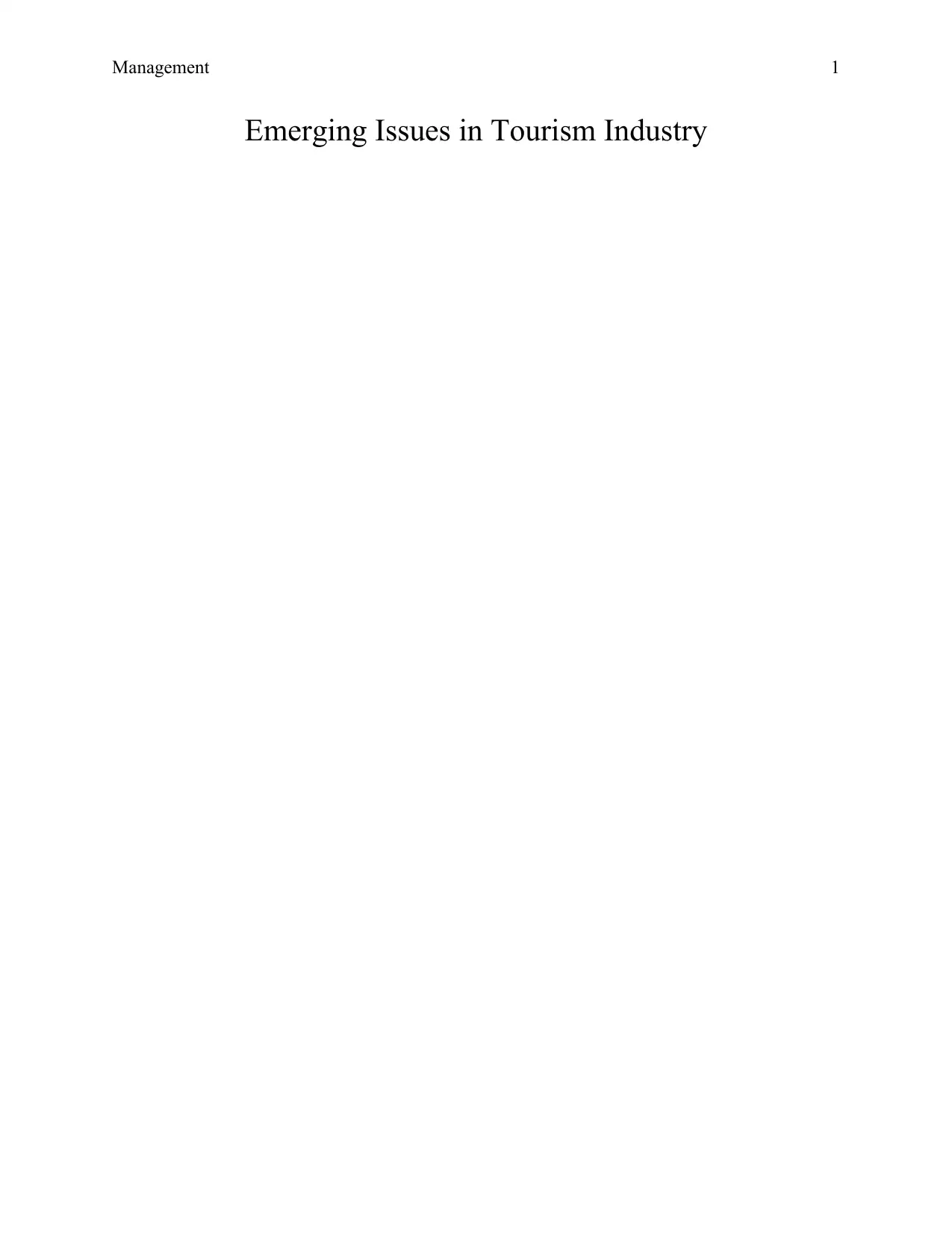
Management 1
Emerging Issues in Tourism Industry
Emerging Issues in Tourism Industry
Paraphrase This Document
Need a fresh take? Get an instant paraphrase of this document with our AI Paraphraser
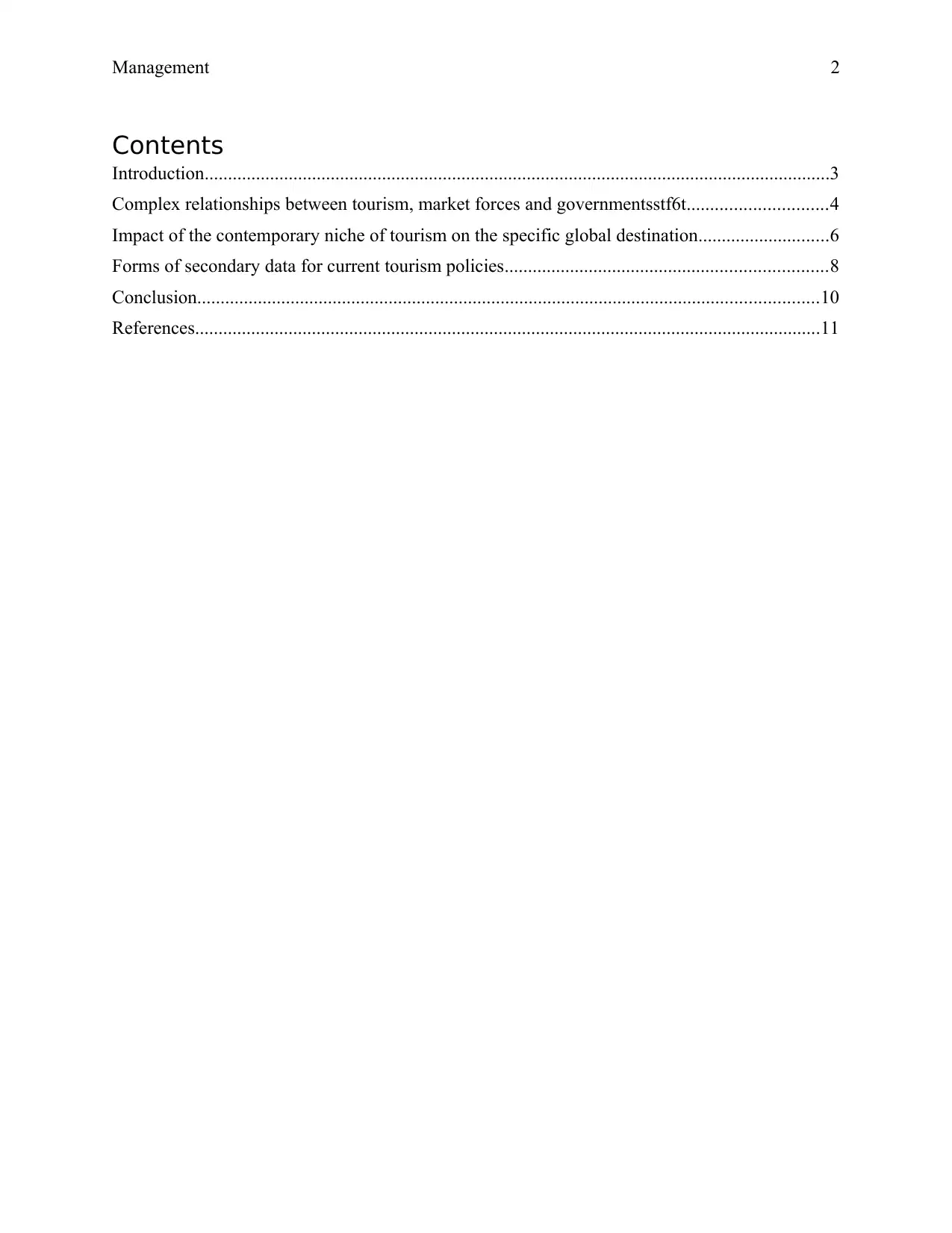
Management 2
Contents
Introduction......................................................................................................................................3
Complex relationships between tourism, market forces and governmentsstf6t..............................4
Impact of the contemporary niche of tourism on the specific global destination............................6
Forms of secondary data for current tourism policies.....................................................................8
Conclusion.....................................................................................................................................10
References......................................................................................................................................11
Contents
Introduction......................................................................................................................................3
Complex relationships between tourism, market forces and governmentsstf6t..............................4
Impact of the contemporary niche of tourism on the specific global destination............................6
Forms of secondary data for current tourism policies.....................................................................8
Conclusion.....................................................................................................................................10
References......................................................................................................................................11
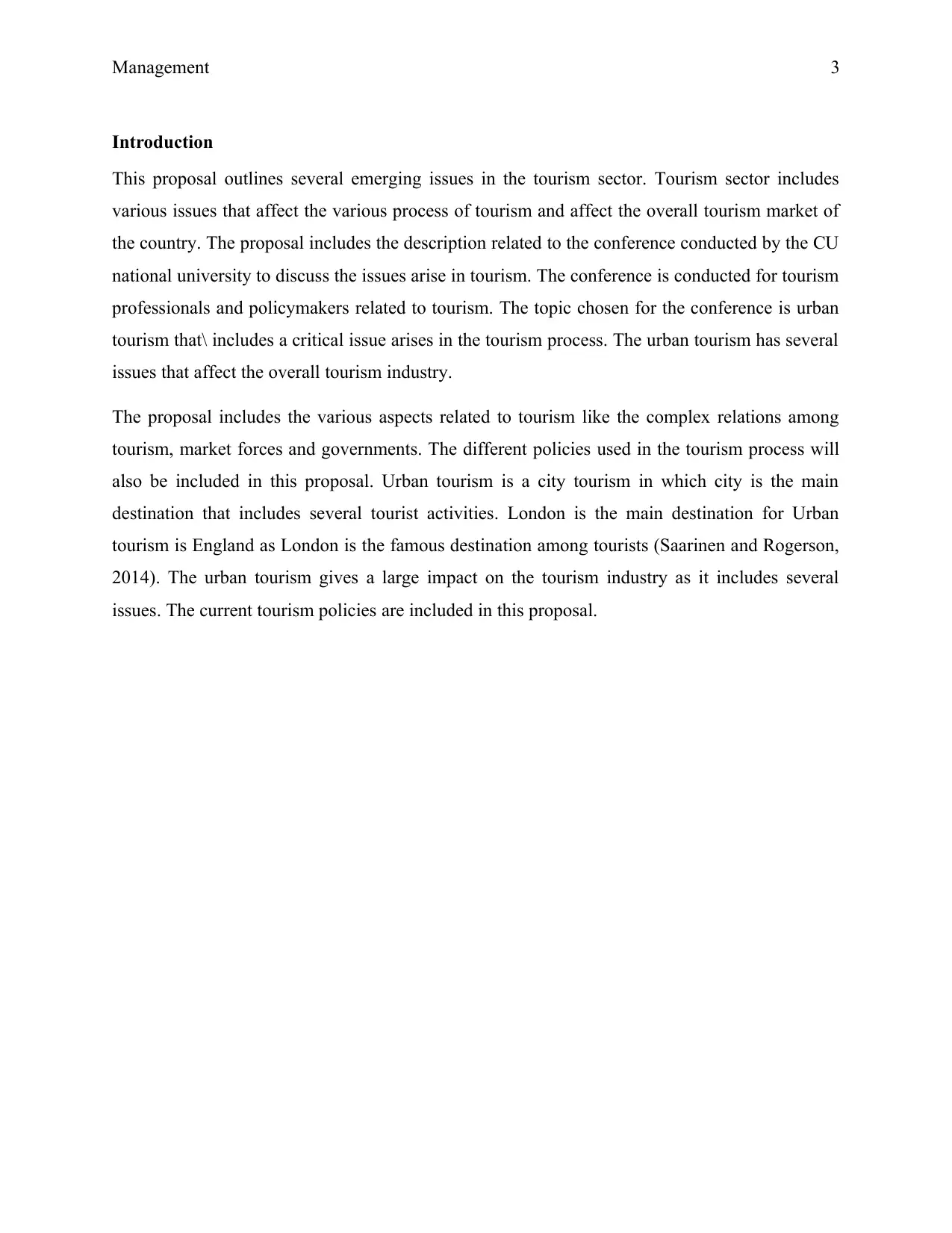
Management 3
Introduction
This proposal outlines several emerging issues in the tourism sector. Tourism sector includes
various issues that affect the various process of tourism and affect the overall tourism market of
the country. The proposal includes the description related to the conference conducted by the CU
national university to discuss the issues arise in tourism. The conference is conducted for tourism
professionals and policymakers related to tourism. The topic chosen for the conference is urban
tourism that\ includes a critical issue arises in the tourism process. The urban tourism has several
issues that affect the overall tourism industry.
The proposal includes the various aspects related to tourism like the complex relations among
tourism, market forces and governments. The different policies used in the tourism process will
also be included in this proposal. Urban tourism is a city tourism in which city is the main
destination that includes several tourist activities. London is the main destination for Urban
tourism is England as London is the famous destination among tourists (Saarinen and Rogerson,
2014). The urban tourism gives a large impact on the tourism industry as it includes several
issues. The current tourism policies are included in this proposal.
Introduction
This proposal outlines several emerging issues in the tourism sector. Tourism sector includes
various issues that affect the various process of tourism and affect the overall tourism market of
the country. The proposal includes the description related to the conference conducted by the CU
national university to discuss the issues arise in tourism. The conference is conducted for tourism
professionals and policymakers related to tourism. The topic chosen for the conference is urban
tourism that\ includes a critical issue arises in the tourism process. The urban tourism has several
issues that affect the overall tourism industry.
The proposal includes the various aspects related to tourism like the complex relations among
tourism, market forces and governments. The different policies used in the tourism process will
also be included in this proposal. Urban tourism is a city tourism in which city is the main
destination that includes several tourist activities. London is the main destination for Urban
tourism is England as London is the famous destination among tourists (Saarinen and Rogerson,
2014). The urban tourism gives a large impact on the tourism industry as it includes several
issues. The current tourism policies are included in this proposal.
⊘ This is a preview!⊘
Do you want full access?
Subscribe today to unlock all pages.

Trusted by 1+ million students worldwide
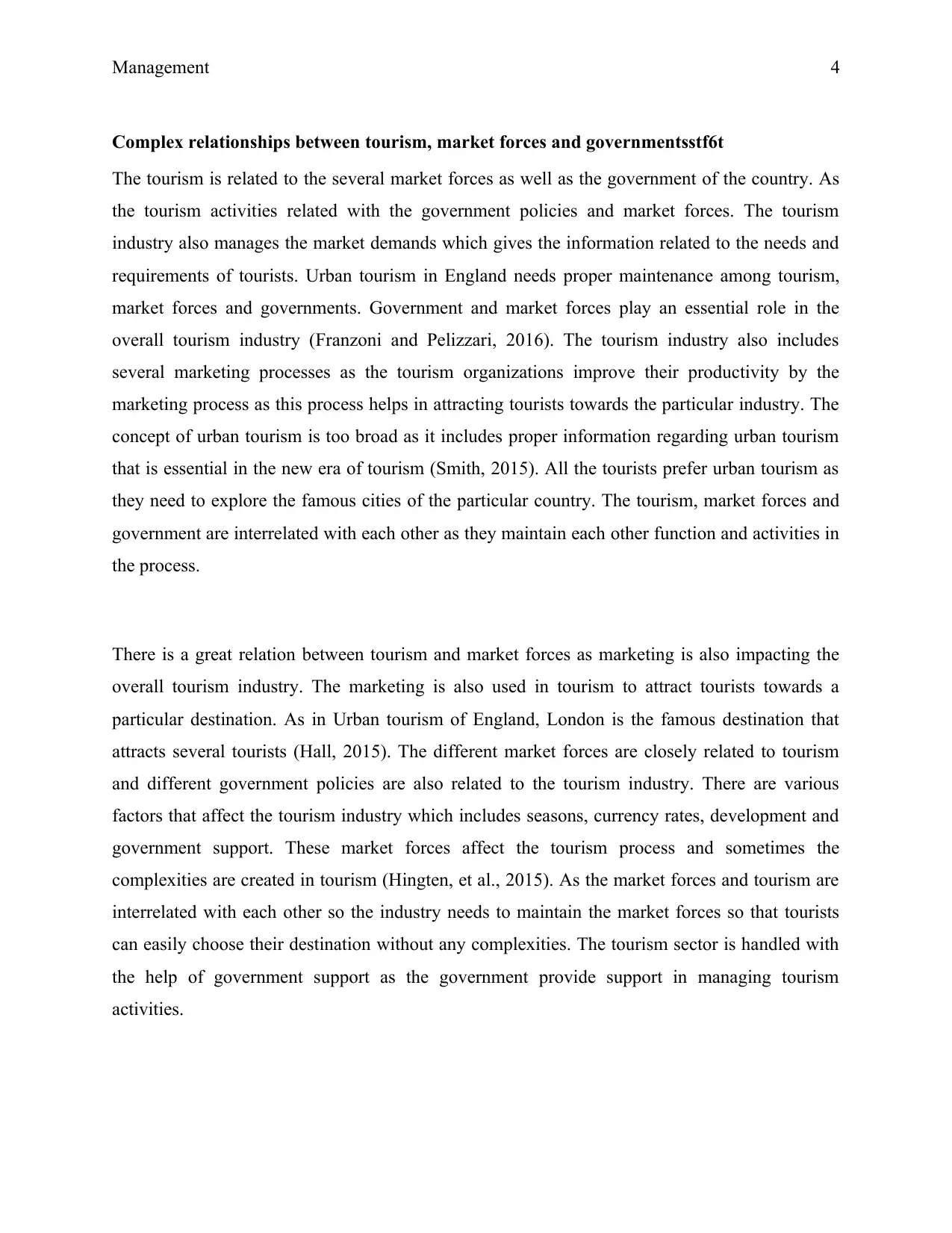
Management 4
Complex relationships between tourism, market forces and governmentsstf6t
The tourism is related to the several market forces as well as the government of the country. As
the tourism activities related with the government policies and market forces. The tourism
industry also manages the market demands which gives the information related to the needs and
requirements of tourists. Urban tourism in England needs proper maintenance among tourism,
market forces and governments. Government and market forces play an essential role in the
overall tourism industry (Franzoni and Pelizzari, 2016). The tourism industry also includes
several marketing processes as the tourism organizations improve their productivity by the
marketing process as this process helps in attracting tourists towards the particular industry. The
concept of urban tourism is too broad as it includes proper information regarding urban tourism
that is essential in the new era of tourism (Smith, 2015). All the tourists prefer urban tourism as
they need to explore the famous cities of the particular country. The tourism, market forces and
government are interrelated with each other as they maintain each other function and activities in
the process.
There is a great relation between tourism and market forces as marketing is also impacting the
overall tourism industry. The marketing is also used in tourism to attract tourists towards a
particular destination. As in Urban tourism of England, London is the famous destination that
attracts several tourists (Hall, 2015). The different market forces are closely related to tourism
and different government policies are also related to the tourism industry. There are various
factors that affect the tourism industry which includes seasons, currency rates, development and
government support. These market forces affect the tourism process and sometimes the
complexities are created in tourism (Hingten, et al., 2015). As the market forces and tourism are
interrelated with each other so the industry needs to maintain the market forces so that tourists
can easily choose their destination without any complexities. The tourism sector is handled with
the help of government support as the government provide support in managing tourism
activities.
Complex relationships between tourism, market forces and governmentsstf6t
The tourism is related to the several market forces as well as the government of the country. As
the tourism activities related with the government policies and market forces. The tourism
industry also manages the market demands which gives the information related to the needs and
requirements of tourists. Urban tourism in England needs proper maintenance among tourism,
market forces and governments. Government and market forces play an essential role in the
overall tourism industry (Franzoni and Pelizzari, 2016). The tourism industry also includes
several marketing processes as the tourism organizations improve their productivity by the
marketing process as this process helps in attracting tourists towards the particular industry. The
concept of urban tourism is too broad as it includes proper information regarding urban tourism
that is essential in the new era of tourism (Smith, 2015). All the tourists prefer urban tourism as
they need to explore the famous cities of the particular country. The tourism, market forces and
government are interrelated with each other as they maintain each other function and activities in
the process.
There is a great relation between tourism and market forces as marketing is also impacting the
overall tourism industry. The marketing is also used in tourism to attract tourists towards a
particular destination. As in Urban tourism of England, London is the famous destination that
attracts several tourists (Hall, 2015). The different market forces are closely related to tourism
and different government policies are also related to the tourism industry. There are various
factors that affect the tourism industry which includes seasons, currency rates, development and
government support. These market forces affect the tourism process and sometimes the
complexities are created in tourism (Hingten, et al., 2015). As the market forces and tourism are
interrelated with each other so the industry needs to maintain the market forces so that tourists
can easily choose their destination without any complexities. The tourism sector is handled with
the help of government support as the government provide support in managing tourism
activities.
Paraphrase This Document
Need a fresh take? Get an instant paraphrase of this document with our AI Paraphraser
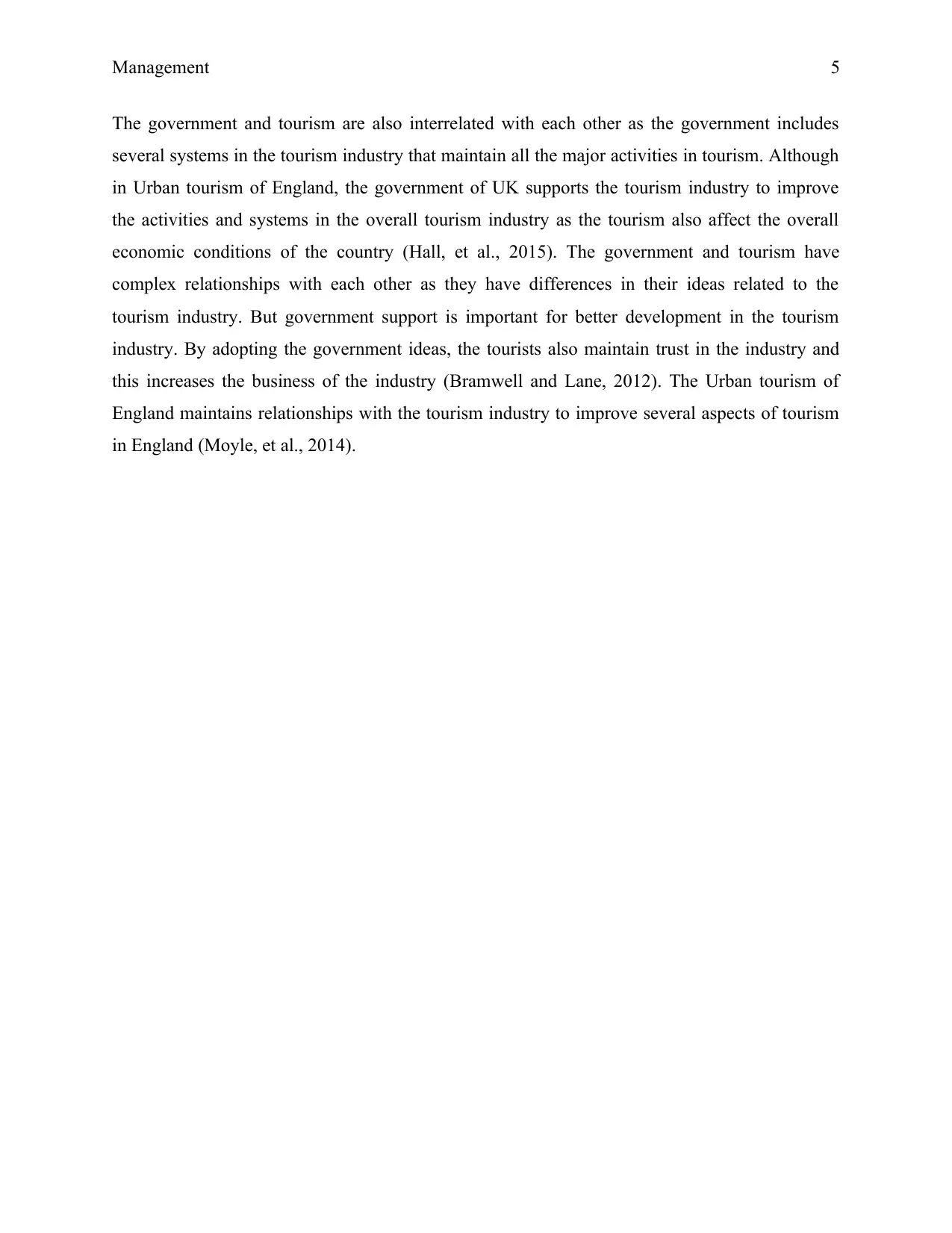
Management 5
The government and tourism are also interrelated with each other as the government includes
several systems in the tourism industry that maintain all the major activities in tourism. Although
in Urban tourism of England, the government of UK supports the tourism industry to improve
the activities and systems in the overall tourism industry as the tourism also affect the overall
economic conditions of the country (Hall, et al., 2015). The government and tourism have
complex relationships with each other as they have differences in their ideas related to the
tourism industry. But government support is important for better development in the tourism
industry. By adopting the government ideas, the tourists also maintain trust in the industry and
this increases the business of the industry (Bramwell and Lane, 2012). The Urban tourism of
England maintains relationships with the tourism industry to improve several aspects of tourism
in England (Moyle, et al., 2014).
The government and tourism are also interrelated with each other as the government includes
several systems in the tourism industry that maintain all the major activities in tourism. Although
in Urban tourism of England, the government of UK supports the tourism industry to improve
the activities and systems in the overall tourism industry as the tourism also affect the overall
economic conditions of the country (Hall, et al., 2015). The government and tourism have
complex relationships with each other as they have differences in their ideas related to the
tourism industry. But government support is important for better development in the tourism
industry. By adopting the government ideas, the tourists also maintain trust in the industry and
this increases the business of the industry (Bramwell and Lane, 2012). The Urban tourism of
England maintains relationships with the tourism industry to improve several aspects of tourism
in England (Moyle, et al., 2014).
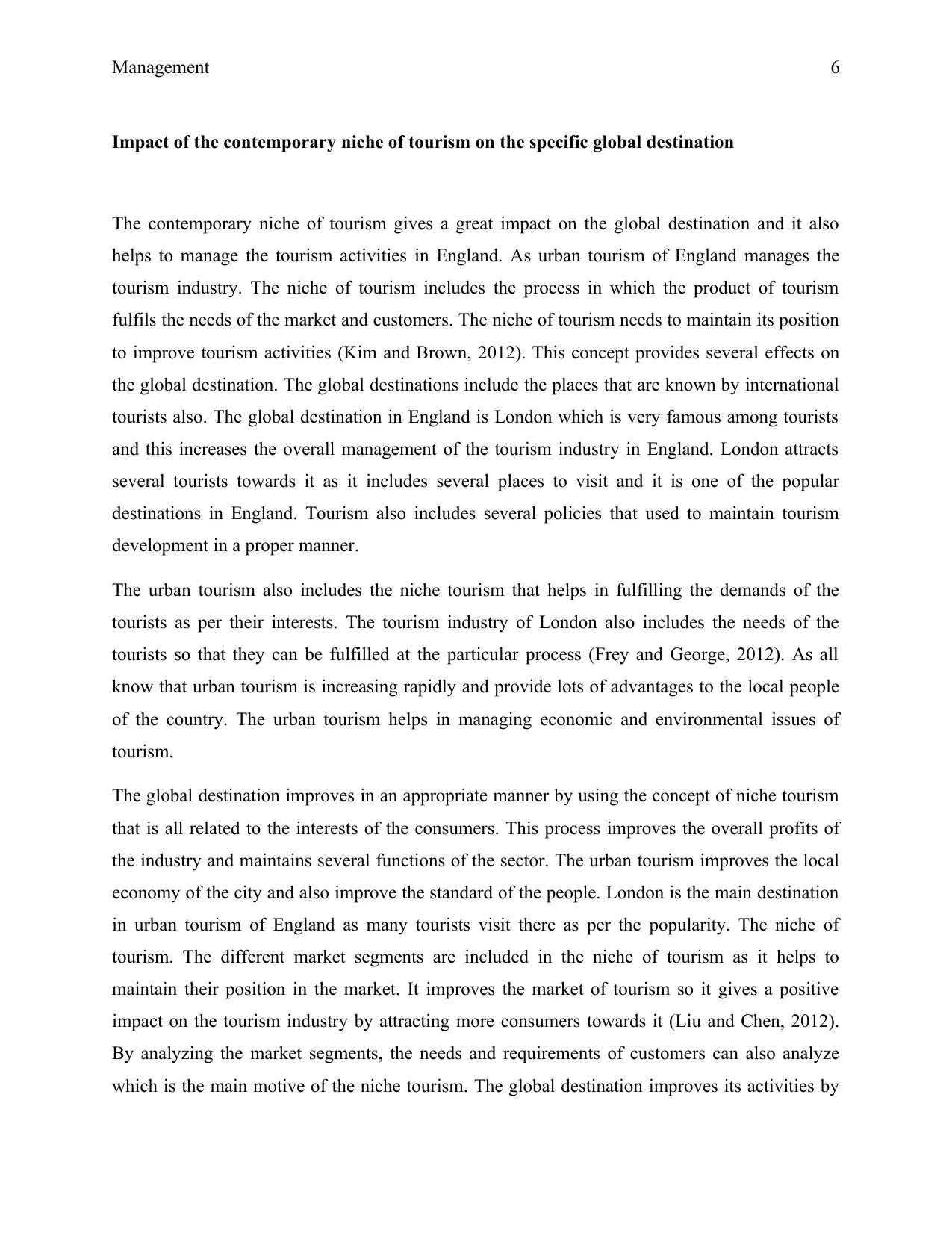
Management 6
Impact of the contemporary niche of tourism on the specific global destination
The contemporary niche of tourism gives a great impact on the global destination and it also
helps to manage the tourism activities in England. As urban tourism of England manages the
tourism industry. The niche of tourism includes the process in which the product of tourism
fulfils the needs of the market and customers. The niche of tourism needs to maintain its position
to improve tourism activities (Kim and Brown, 2012). This concept provides several effects on
the global destination. The global destinations include the places that are known by international
tourists also. The global destination in England is London which is very famous among tourists
and this increases the overall management of the tourism industry in England. London attracts
several tourists towards it as it includes several places to visit and it is one of the popular
destinations in England. Tourism also includes several policies that used to maintain tourism
development in a proper manner.
The urban tourism also includes the niche tourism that helps in fulfilling the demands of the
tourists as per their interests. The tourism industry of London also includes the needs of the
tourists so that they can be fulfilled at the particular process (Frey and George, 2012). As all
know that urban tourism is increasing rapidly and provide lots of advantages to the local people
of the country. The urban tourism helps in managing economic and environmental issues of
tourism.
The global destination improves in an appropriate manner by using the concept of niche tourism
that is all related to the interests of the consumers. This process improves the overall profits of
the industry and maintains several functions of the sector. The urban tourism improves the local
economy of the city and also improve the standard of the people. London is the main destination
in urban tourism of England as many tourists visit there as per the popularity. The niche of
tourism. The different market segments are included in the niche of tourism as it helps to
maintain their position in the market. It improves the market of tourism so it gives a positive
impact on the tourism industry by attracting more consumers towards it (Liu and Chen, 2012).
By analyzing the market segments, the needs and requirements of customers can also analyze
which is the main motive of the niche tourism. The global destination improves its activities by
Impact of the contemporary niche of tourism on the specific global destination
The contemporary niche of tourism gives a great impact on the global destination and it also
helps to manage the tourism activities in England. As urban tourism of England manages the
tourism industry. The niche of tourism includes the process in which the product of tourism
fulfils the needs of the market and customers. The niche of tourism needs to maintain its position
to improve tourism activities (Kim and Brown, 2012). This concept provides several effects on
the global destination. The global destinations include the places that are known by international
tourists also. The global destination in England is London which is very famous among tourists
and this increases the overall management of the tourism industry in England. London attracts
several tourists towards it as it includes several places to visit and it is one of the popular
destinations in England. Tourism also includes several policies that used to maintain tourism
development in a proper manner.
The urban tourism also includes the niche tourism that helps in fulfilling the demands of the
tourists as per their interests. The tourism industry of London also includes the needs of the
tourists so that they can be fulfilled at the particular process (Frey and George, 2012). As all
know that urban tourism is increasing rapidly and provide lots of advantages to the local people
of the country. The urban tourism helps in managing economic and environmental issues of
tourism.
The global destination improves in an appropriate manner by using the concept of niche tourism
that is all related to the interests of the consumers. This process improves the overall profits of
the industry and maintains several functions of the sector. The urban tourism improves the local
economy of the city and also improve the standard of the people. London is the main destination
in urban tourism of England as many tourists visit there as per the popularity. The niche of
tourism. The different market segments are included in the niche of tourism as it helps to
maintain their position in the market. It improves the market of tourism so it gives a positive
impact on the tourism industry by attracting more consumers towards it (Liu and Chen, 2012).
By analyzing the market segments, the needs and requirements of customers can also analyze
which is the main motive of the niche tourism. The global destination improves its activities by
⊘ This is a preview!⊘
Do you want full access?
Subscribe today to unlock all pages.

Trusted by 1+ million students worldwide
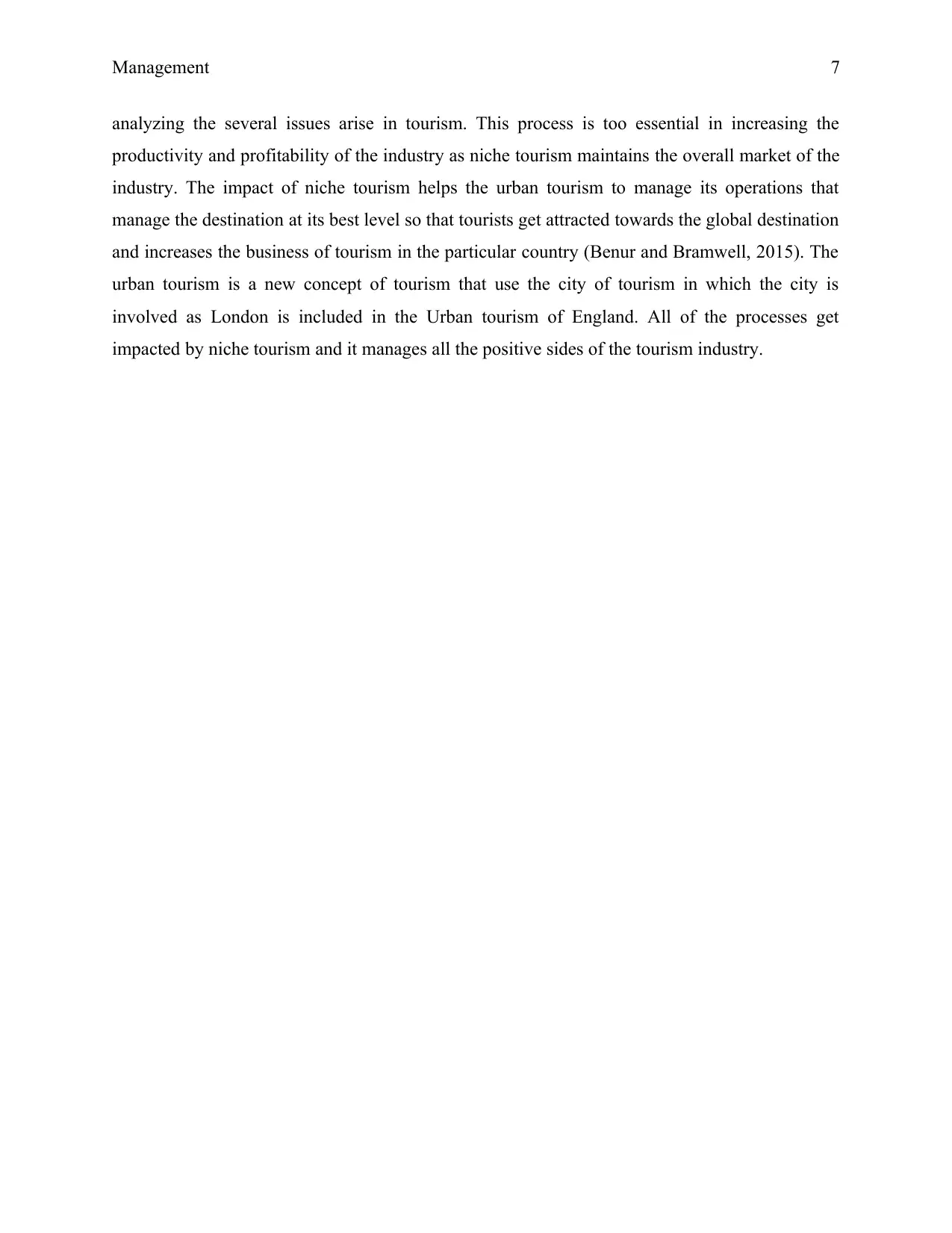
Management 7
analyzing the several issues arise in tourism. This process is too essential in increasing the
productivity and profitability of the industry as niche tourism maintains the overall market of the
industry. The impact of niche tourism helps the urban tourism to manage its operations that
manage the destination at its best level so that tourists get attracted towards the global destination
and increases the business of tourism in the particular country (Benur and Bramwell, 2015). The
urban tourism is a new concept of tourism that use the city of tourism in which the city is
involved as London is included in the Urban tourism of England. All of the processes get
impacted by niche tourism and it manages all the positive sides of the tourism industry.
analyzing the several issues arise in tourism. This process is too essential in increasing the
productivity and profitability of the industry as niche tourism maintains the overall market of the
industry. The impact of niche tourism helps the urban tourism to manage its operations that
manage the destination at its best level so that tourists get attracted towards the global destination
and increases the business of tourism in the particular country (Benur and Bramwell, 2015). The
urban tourism is a new concept of tourism that use the city of tourism in which the city is
involved as London is included in the Urban tourism of England. All of the processes get
impacted by niche tourism and it manages all the positive sides of the tourism industry.
Paraphrase This Document
Need a fresh take? Get an instant paraphrase of this document with our AI Paraphraser
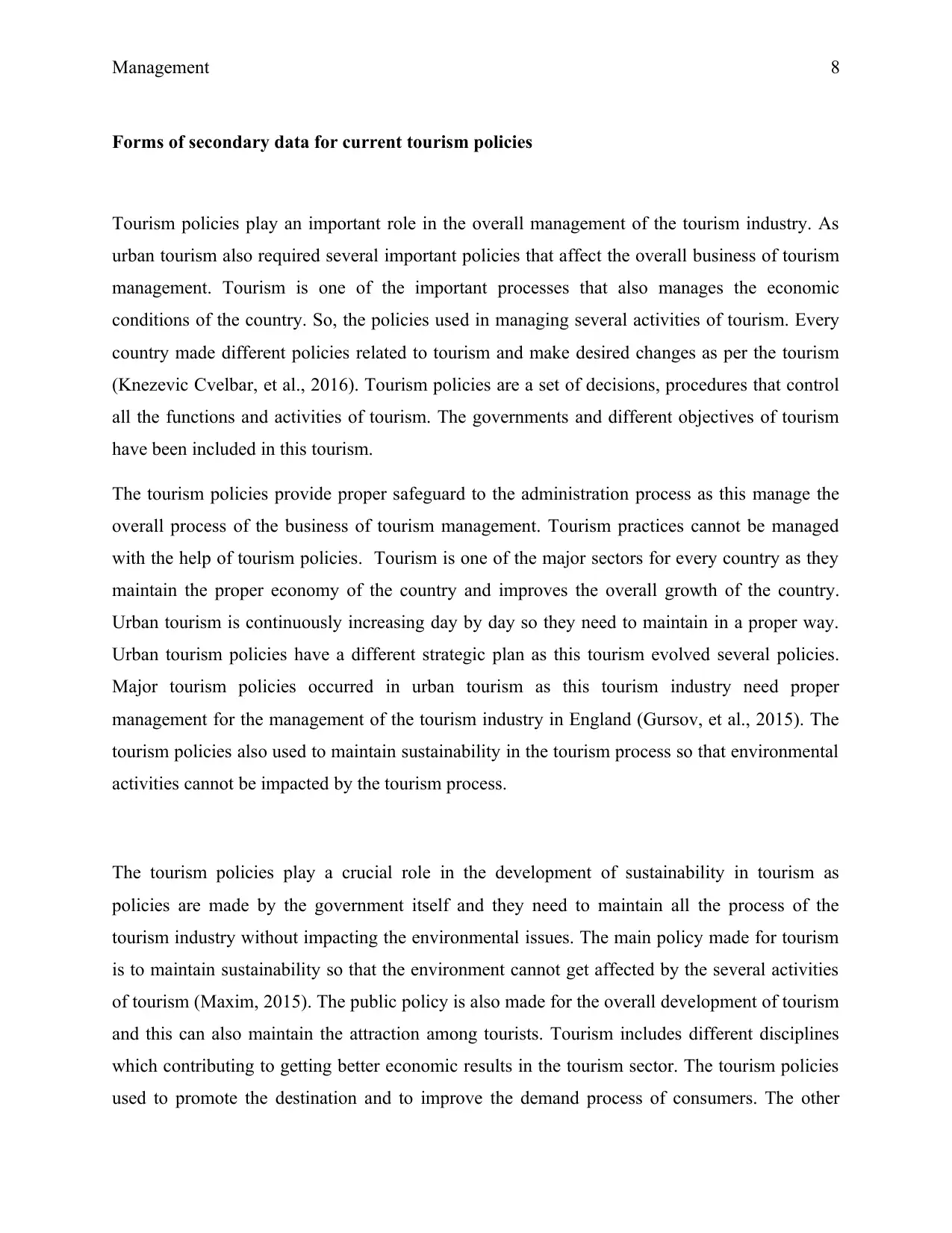
Management 8
Forms of secondary data for current tourism policies
Tourism policies play an important role in the overall management of the tourism industry. As
urban tourism also required several important policies that affect the overall business of tourism
management. Tourism is one of the important processes that also manages the economic
conditions of the country. So, the policies used in managing several activities of tourism. Every
country made different policies related to tourism and make desired changes as per the tourism
(Knezevic Cvelbar, et al., 2016). Tourism policies are a set of decisions, procedures that control
all the functions and activities of tourism. The governments and different objectives of tourism
have been included in this tourism.
The tourism policies provide proper safeguard to the administration process as this manage the
overall process of the business of tourism management. Tourism practices cannot be managed
with the help of tourism policies. Tourism is one of the major sectors for every country as they
maintain the proper economy of the country and improves the overall growth of the country.
Urban tourism is continuously increasing day by day so they need to maintain in a proper way.
Urban tourism policies have a different strategic plan as this tourism evolved several policies.
Major tourism policies occurred in urban tourism as this tourism industry need proper
management for the management of the tourism industry in England (Gursov, et al., 2015). The
tourism policies also used to maintain sustainability in the tourism process so that environmental
activities cannot be impacted by the tourism process.
The tourism policies play a crucial role in the development of sustainability in tourism as
policies are made by the government itself and they need to maintain all the process of the
tourism industry without impacting the environmental issues. The main policy made for tourism
is to maintain sustainability so that the environment cannot get affected by the several activities
of tourism (Maxim, 2015). The public policy is also made for the overall development of tourism
and this can also maintain the attraction among tourists. Tourism includes different disciplines
which contributing to getting better economic results in the tourism sector. The tourism policies
used to promote the destination and to improve the demand process of consumers. The other
Forms of secondary data for current tourism policies
Tourism policies play an important role in the overall management of the tourism industry. As
urban tourism also required several important policies that affect the overall business of tourism
management. Tourism is one of the important processes that also manages the economic
conditions of the country. So, the policies used in managing several activities of tourism. Every
country made different policies related to tourism and make desired changes as per the tourism
(Knezevic Cvelbar, et al., 2016). Tourism policies are a set of decisions, procedures that control
all the functions and activities of tourism. The governments and different objectives of tourism
have been included in this tourism.
The tourism policies provide proper safeguard to the administration process as this manage the
overall process of the business of tourism management. Tourism practices cannot be managed
with the help of tourism policies. Tourism is one of the major sectors for every country as they
maintain the proper economy of the country and improves the overall growth of the country.
Urban tourism is continuously increasing day by day so they need to maintain in a proper way.
Urban tourism policies have a different strategic plan as this tourism evolved several policies.
Major tourism policies occurred in urban tourism as this tourism industry need proper
management for the management of the tourism industry in England (Gursov, et al., 2015). The
tourism policies also used to maintain sustainability in the tourism process so that environmental
activities cannot be impacted by the tourism process.
The tourism policies play a crucial role in the development of sustainability in tourism as
policies are made by the government itself and they need to maintain all the process of the
tourism industry without impacting the environmental issues. The main policy made for tourism
is to maintain sustainability so that the environment cannot get affected by the several activities
of tourism (Maxim, 2015). The public policy is also made for the overall development of tourism
and this can also maintain the attraction among tourists. Tourism includes different disciplines
which contributing to getting better economic results in the tourism sector. The tourism policies
used to promote the destination and to improve the demand process of consumers. The other
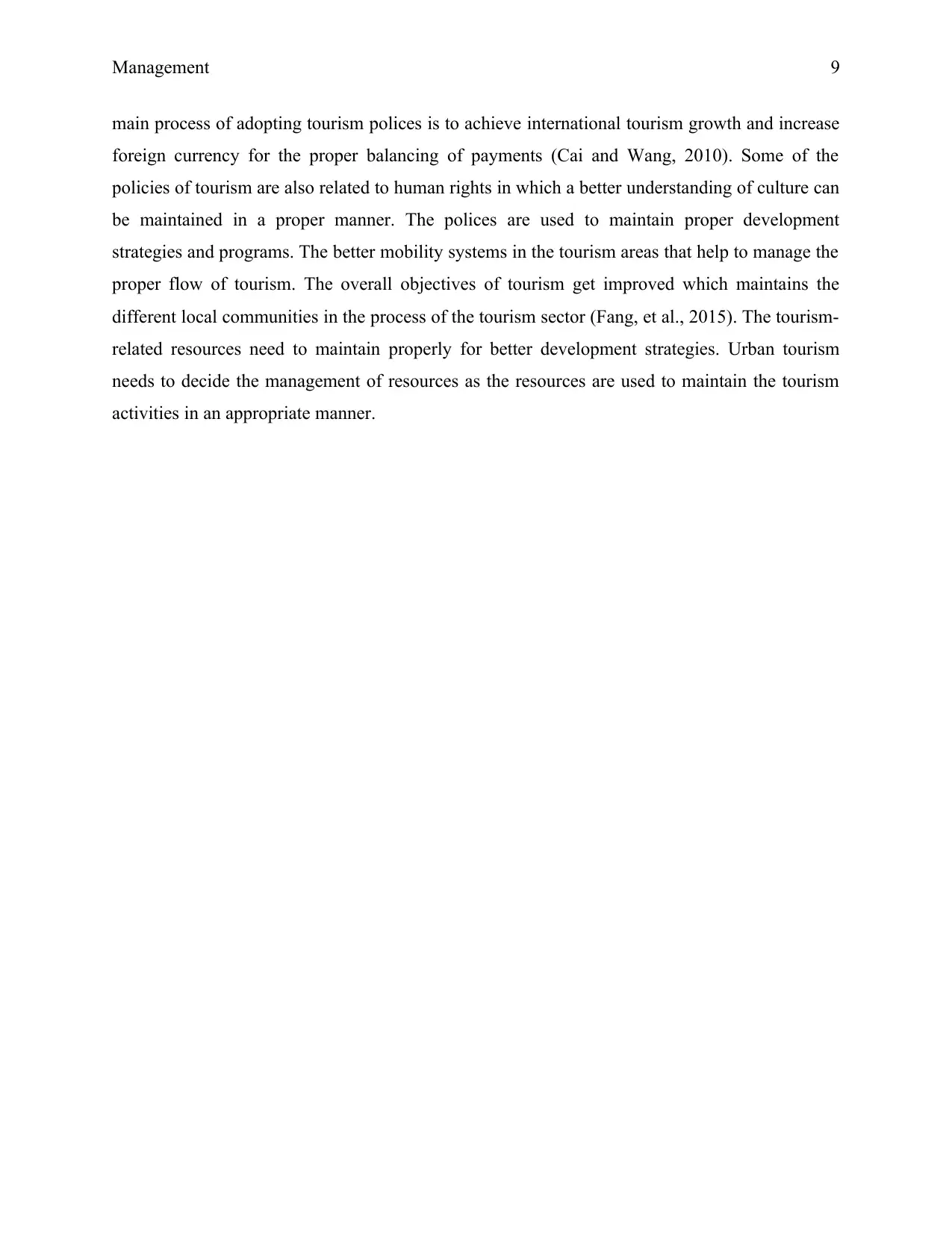
Management 9
main process of adopting tourism polices is to achieve international tourism growth and increase
foreign currency for the proper balancing of payments (Cai and Wang, 2010). Some of the
policies of tourism are also related to human rights in which a better understanding of culture can
be maintained in a proper manner. The polices are used to maintain proper development
strategies and programs. The better mobility systems in the tourism areas that help to manage the
proper flow of tourism. The overall objectives of tourism get improved which maintains the
different local communities in the process of the tourism sector (Fang, et al., 2015). The tourism-
related resources need to maintain properly for better development strategies. Urban tourism
needs to decide the management of resources as the resources are used to maintain the tourism
activities in an appropriate manner.
main process of adopting tourism polices is to achieve international tourism growth and increase
foreign currency for the proper balancing of payments (Cai and Wang, 2010). Some of the
policies of tourism are also related to human rights in which a better understanding of culture can
be maintained in a proper manner. The polices are used to maintain proper development
strategies and programs. The better mobility systems in the tourism areas that help to manage the
proper flow of tourism. The overall objectives of tourism get improved which maintains the
different local communities in the process of the tourism sector (Fang, et al., 2015). The tourism-
related resources need to maintain properly for better development strategies. Urban tourism
needs to decide the management of resources as the resources are used to maintain the tourism
activities in an appropriate manner.
⊘ This is a preview!⊘
Do you want full access?
Subscribe today to unlock all pages.

Trusted by 1+ million students worldwide
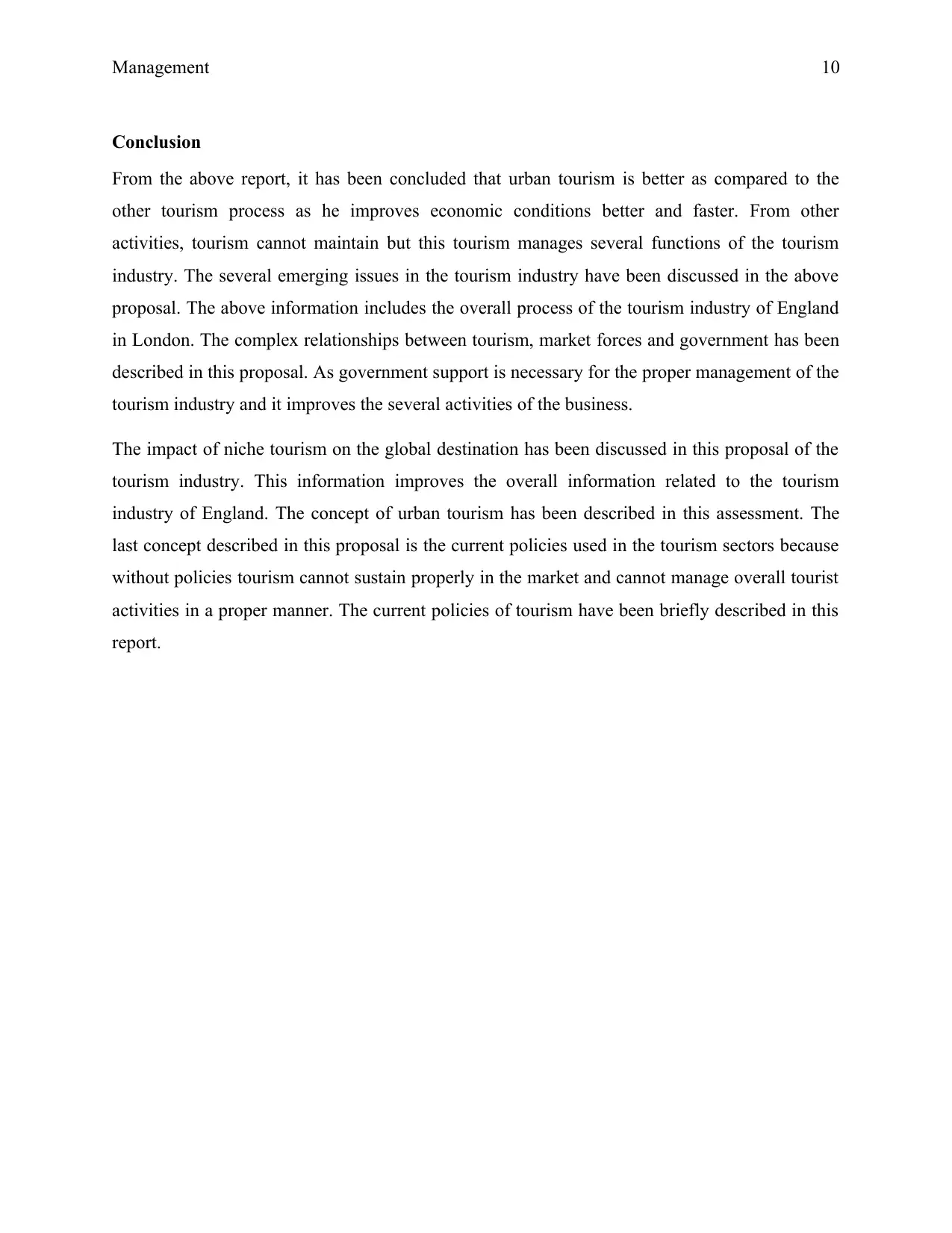
Management 10
Conclusion
From the above report, it has been concluded that urban tourism is better as compared to the
other tourism process as he improves economic conditions better and faster. From other
activities, tourism cannot maintain but this tourism manages several functions of the tourism
industry. The several emerging issues in the tourism industry have been discussed in the above
proposal. The above information includes the overall process of the tourism industry of England
in London. The complex relationships between tourism, market forces and government has been
described in this proposal. As government support is necessary for the proper management of the
tourism industry and it improves the several activities of the business.
The impact of niche tourism on the global destination has been discussed in this proposal of the
tourism industry. This information improves the overall information related to the tourism
industry of England. The concept of urban tourism has been described in this assessment. The
last concept described in this proposal is the current policies used in the tourism sectors because
without policies tourism cannot sustain properly in the market and cannot manage overall tourist
activities in a proper manner. The current policies of tourism have been briefly described in this
report.
Conclusion
From the above report, it has been concluded that urban tourism is better as compared to the
other tourism process as he improves economic conditions better and faster. From other
activities, tourism cannot maintain but this tourism manages several functions of the tourism
industry. The several emerging issues in the tourism industry have been discussed in the above
proposal. The above information includes the overall process of the tourism industry of England
in London. The complex relationships between tourism, market forces and government has been
described in this proposal. As government support is necessary for the proper management of the
tourism industry and it improves the several activities of the business.
The impact of niche tourism on the global destination has been discussed in this proposal of the
tourism industry. This information improves the overall information related to the tourism
industry of England. The concept of urban tourism has been described in this assessment. The
last concept described in this proposal is the current policies used in the tourism sectors because
without policies tourism cannot sustain properly in the market and cannot manage overall tourist
activities in a proper manner. The current policies of tourism have been briefly described in this
report.
Paraphrase This Document
Need a fresh take? Get an instant paraphrase of this document with our AI Paraphraser
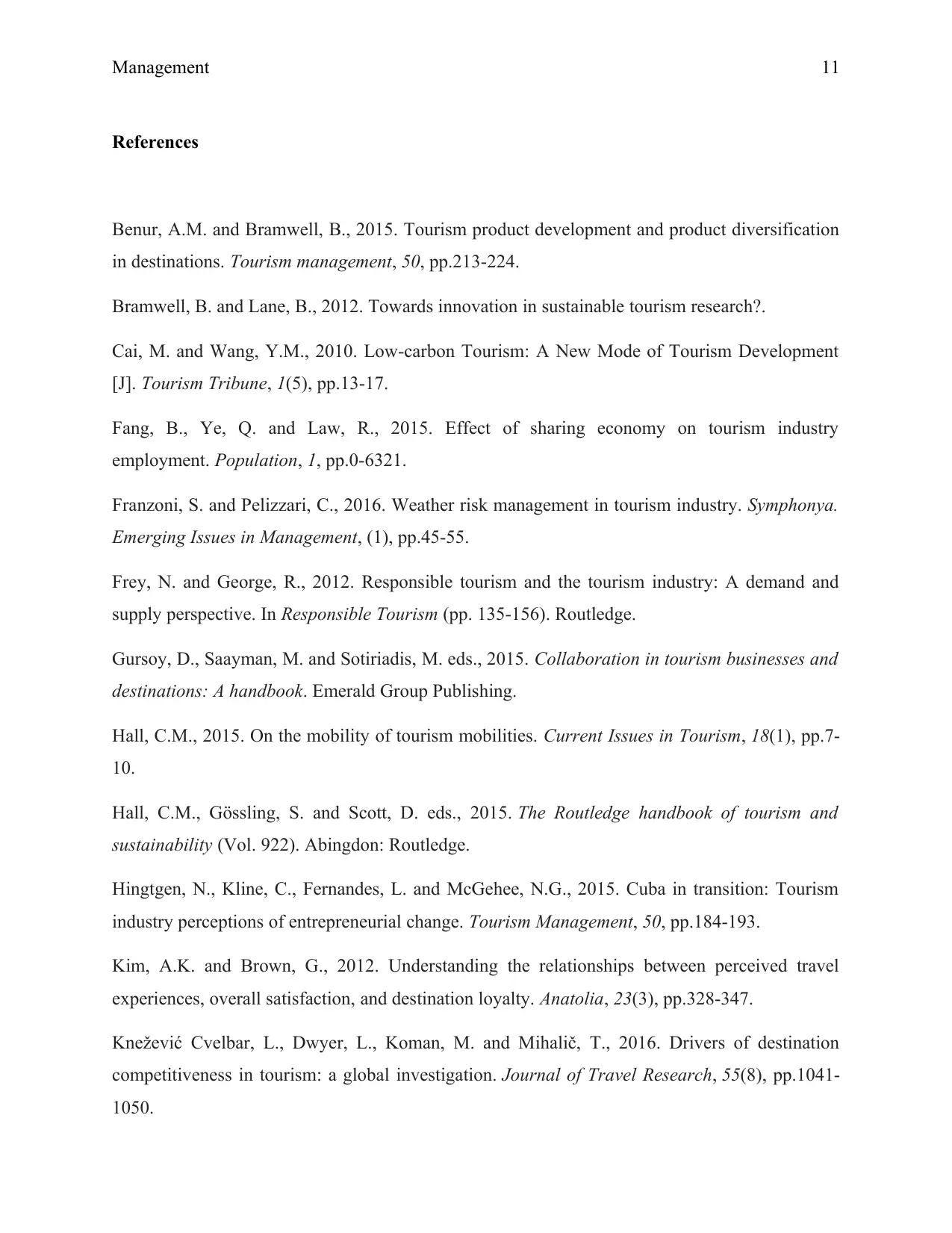
Management 11
References
Benur, A.M. and Bramwell, B., 2015. Tourism product development and product diversification
in destinations. Tourism management, 50, pp.213-224.
Bramwell, B. and Lane, B., 2012. Towards innovation in sustainable tourism research?.
Cai, M. and Wang, Y.M., 2010. Low-carbon Tourism: A New Mode of Tourism Development
[J]. Tourism Tribune, 1(5), pp.13-17.
Fang, B., Ye, Q. and Law, R., 2015. Effect of sharing economy on tourism industry
employment. Population, 1, pp.0-6321.
Franzoni, S. and Pelizzari, C., 2016. Weather risk management in tourism industry. Symphonya.
Emerging Issues in Management, (1), pp.45-55.
Frey, N. and George, R., 2012. Responsible tourism and the tourism industry: A demand and
supply perspective. In Responsible Tourism (pp. 135-156). Routledge.
Gursoy, D., Saayman, M. and Sotiriadis, M. eds., 2015. Collaboration in tourism businesses and
destinations: A handbook. Emerald Group Publishing.
Hall, C.M., 2015. On the mobility of tourism mobilities. Current Issues in Tourism, 18(1), pp.7-
10.
Hall, C.M., Gössling, S. and Scott, D. eds., 2015. The Routledge handbook of tourism and
sustainability (Vol. 922). Abingdon: Routledge.
Hingtgen, N., Kline, C., Fernandes, L. and McGehee, N.G., 2015. Cuba in transition: Tourism
industry perceptions of entrepreneurial change. Tourism Management, 50, pp.184-193.
Kim, A.K. and Brown, G., 2012. Understanding the relationships between perceived travel
experiences, overall satisfaction, and destination loyalty. Anatolia, 23(3), pp.328-347.
Knežević Cvelbar, L., Dwyer, L., Koman, M. and Mihalič, T., 2016. Drivers of destination
competitiveness in tourism: a global investigation. Journal of Travel Research, 55(8), pp.1041-
1050.
References
Benur, A.M. and Bramwell, B., 2015. Tourism product development and product diversification
in destinations. Tourism management, 50, pp.213-224.
Bramwell, B. and Lane, B., 2012. Towards innovation in sustainable tourism research?.
Cai, M. and Wang, Y.M., 2010. Low-carbon Tourism: A New Mode of Tourism Development
[J]. Tourism Tribune, 1(5), pp.13-17.
Fang, B., Ye, Q. and Law, R., 2015. Effect of sharing economy on tourism industry
employment. Population, 1, pp.0-6321.
Franzoni, S. and Pelizzari, C., 2016. Weather risk management in tourism industry. Symphonya.
Emerging Issues in Management, (1), pp.45-55.
Frey, N. and George, R., 2012. Responsible tourism and the tourism industry: A demand and
supply perspective. In Responsible Tourism (pp. 135-156). Routledge.
Gursoy, D., Saayman, M. and Sotiriadis, M. eds., 2015. Collaboration in tourism businesses and
destinations: A handbook. Emerald Group Publishing.
Hall, C.M., 2015. On the mobility of tourism mobilities. Current Issues in Tourism, 18(1), pp.7-
10.
Hall, C.M., Gössling, S. and Scott, D. eds., 2015. The Routledge handbook of tourism and
sustainability (Vol. 922). Abingdon: Routledge.
Hingtgen, N., Kline, C., Fernandes, L. and McGehee, N.G., 2015. Cuba in transition: Tourism
industry perceptions of entrepreneurial change. Tourism Management, 50, pp.184-193.
Kim, A.K. and Brown, G., 2012. Understanding the relationships between perceived travel
experiences, overall satisfaction, and destination loyalty. Anatolia, 23(3), pp.328-347.
Knežević Cvelbar, L., Dwyer, L., Koman, M. and Mihalič, T., 2016. Drivers of destination
competitiveness in tourism: a global investigation. Journal of Travel Research, 55(8), pp.1041-
1050.
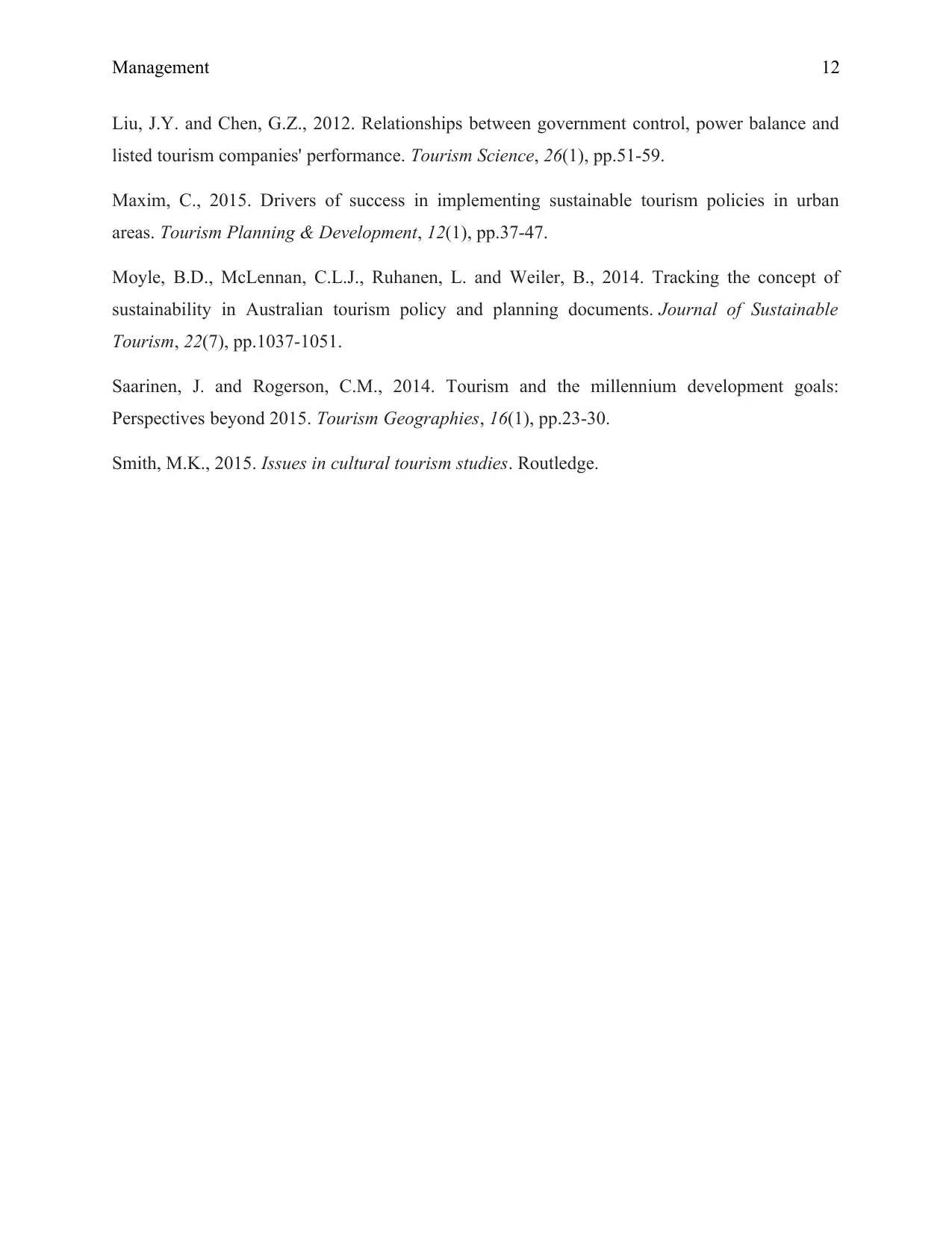
Management 12
Liu, J.Y. and Chen, G.Z., 2012. Relationships between government control, power balance and
listed tourism companies' performance. Tourism Science, 26(1), pp.51-59.
Maxim, C., 2015. Drivers of success in implementing sustainable tourism policies in urban
areas. Tourism Planning & Development, 12(1), pp.37-47.
Moyle, B.D., McLennan, C.L.J., Ruhanen, L. and Weiler, B., 2014. Tracking the concept of
sustainability in Australian tourism policy and planning documents. Journal of Sustainable
Tourism, 22(7), pp.1037-1051.
Saarinen, J. and Rogerson, C.M., 2014. Tourism and the millennium development goals:
Perspectives beyond 2015. Tourism Geographies, 16(1), pp.23-30.
Smith, M.K., 2015. Issues in cultural tourism studies. Routledge.
Liu, J.Y. and Chen, G.Z., 2012. Relationships between government control, power balance and
listed tourism companies' performance. Tourism Science, 26(1), pp.51-59.
Maxim, C., 2015. Drivers of success in implementing sustainable tourism policies in urban
areas. Tourism Planning & Development, 12(1), pp.37-47.
Moyle, B.D., McLennan, C.L.J., Ruhanen, L. and Weiler, B., 2014. Tracking the concept of
sustainability in Australian tourism policy and planning documents. Journal of Sustainable
Tourism, 22(7), pp.1037-1051.
Saarinen, J. and Rogerson, C.M., 2014. Tourism and the millennium development goals:
Perspectives beyond 2015. Tourism Geographies, 16(1), pp.23-30.
Smith, M.K., 2015. Issues in cultural tourism studies. Routledge.
⊘ This is a preview!⊘
Do you want full access?
Subscribe today to unlock all pages.

Trusted by 1+ million students worldwide
1 out of 12
Related Documents
Your All-in-One AI-Powered Toolkit for Academic Success.
+13062052269
info@desklib.com
Available 24*7 on WhatsApp / Email
![[object Object]](/_next/static/media/star-bottom.7253800d.svg)
Unlock your academic potential
Copyright © 2020–2026 A2Z Services. All Rights Reserved. Developed and managed by ZUCOL.




